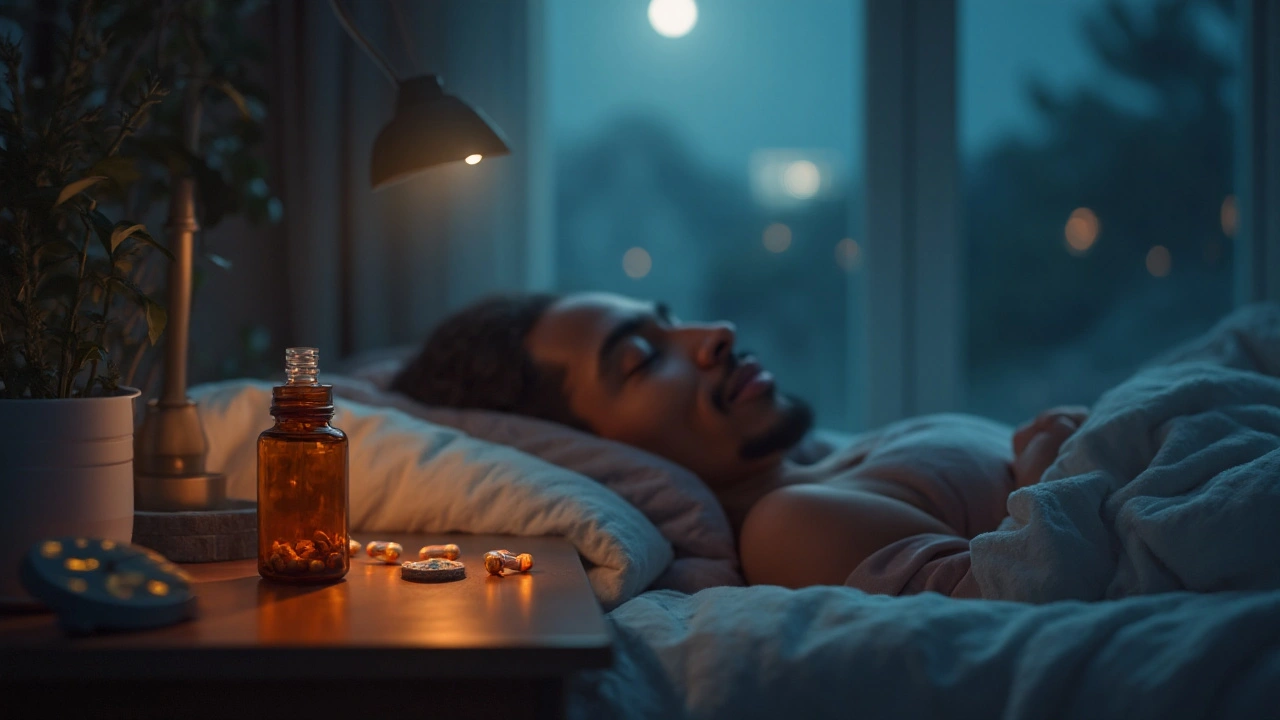TL;DR
- Melatonin is a naturally‑produced hormone that regulates your sleep‑wake cycle.
- Supplemental melatonin can help shift‑workers, jet‑lag sufferers and occasional insomniacs fall asleep faster.
- Typical adult dose ranges from 0.5mg to 5mg taken 30‑60minutes before bed.
- Common side effects are mild - headache, dizziness or mild stomach upset.
- Check for drug interactions and avoid use if you’re pregnant, nursing or have certain medical conditions without doctor approval.
What is melatonin and why it matters
Melatonin is a hormone made by the pineal gland in the brain. When darkness falls, your body ramps up production, sending a signal that it’s time to wind down. The opposite happens in daylight - production drops, keeping you alert. Because of this clear link to light, melatonin is often called the “darkness hormone.”
In supplement form, melatonin mimics the body’s natural signal, helping people whose internal clocks are out of sync. Think of shift‑workers who need to sleep during the day, travelers crossing time zones, or anyone who struggles to fall asleep just because the brain isn’t getting the right cue.
Unlike prescription sleep meds that act on neurotransmitters, melatonin works upstream. It nudges the circadian rhythm back onto track rather than forcing sleep, which is why many users report a gentler, more natural feeling when they finally drift off.
How melatonin works to improve sleep
The sleep‑wake cycle is controlled by the suprachiasmatic nucleus (SCN), a tiny region in the hypothalamus that acts like a master clock. Light signals travel from the eyes to the SCN, which then tells the pineal gland when to release melatonin. When you take a supplement, you’re essentially feeding the SCN extra information that it’s night time.
Research published in the Journal of Clinical Sleep Medicine (2023) shows that a low dose (0.5‑3mg) taken 30‑60minutes before bedtime can reduce sleep‑onset latency by an average of 12‑15 minutes in healthy adults. The effect is strongest in people with delayed sleep‑phase syndrome - a condition where the internal clock runs later than societal norms.
Melatonin also influences other hormones like cortisol, which spikes in the morning to help you wake up. By smoothing the transition from night to day, it can improve overall sleep quality, not just the speed of falling asleep.

Dosage, timing, and practical tips
Finding the right dose is a matter of trial and error, but a few rules of thumb can save you headaches (literally) and wasted pills.
| Age / Group | Typical Dose | Best Time to Take | Notes |
|---|---|---|---|
| Adults (18‑64) | 0.5‑5mg | 30‑60min before bedtime | Start low; increase only if needed. |
| Older adults (65+) | 0.5‑2mg | 30‑60min before bedtime | Higher sensitivity; keep dose minimal. |
| Children (under 12) | 0.1‑0.5mg | 30‑60min before bedtime | Only under pediatric guidance. |
| Jet‑lag travelers | 0.5‑3mg | At local bedtime for 2‑5 nights | Adjust dose for east‑west travel direction. |
Key timing tips:
- Consistency matters: Take it at the same clock time each night, even on weekends.
- Don’t combine with bright screens. If you need to use devices, wear blue‑light blocking glasses.
- If you’re sensitive to caffeine, cut it out after 2pm; caffeine can blunt melatonin’s effect.
- For night‑shifts, take the supplement 30minutes before your intended sleep window, even if that’s in the middle of the day.
Because melatonin is water‑soluble, it’s quickly absorbed and cleared. That’s why a short‑acting dose works for most people. Extended‑release formulations exist, but they’re usually reserved for people who wake up frequently during the night.
Side effects, interactions, and safe‑use guidelines
Melatonin is one of the most studied supplements on the market, and it has a solid safety record when used as directed. Still, a few cautions are worth noting.
- Mild side effects: Headache, dizziness, nausea or slight daytime grogginess. These usually resolve by cutting the dose in half.
- Drug interactions: Anticoagulants (e.g., warfarin), immunosuppressants, diabetes meds, and birth‑control pills can be affected. Always check with a pharmacist if you’re on prescription drugs.
- Pregnancy and breastfeeding: There isn’t enough robust data, so most guidelines advise against routine use.
- Auto‑immune conditions: Because melatonin can modulate immune function, people with lupus, rheumatoid arthritis, or multiple sclerosis should speak to a doctor first.
Another pitfall is using melatonin as a long‑term crutch. It’s great for occasional sleep disruptions, but if you need it night after night for months, it may signal an underlying sleep hygiene issue. Consider reviewing these habits:
- Keep the bedroom cool (around 18‑19°C) and dark.
- Reserve the bed for sleep only - no work or scrolling.
- Establish a calming pre‑sleep routine: reading, gentle stretching, or a warm shower.
Common questions answered
- Can I take melatonin every night? Short‑term use (a few weeks) is fine. For chronic insomnia, consult a healthcare professional.
- Will melatonin make me drowsy the next day? If you take a dose that’s too high or too late, you might feel groggy. Reduce the amount or move the timing earlier.
- Is melatonin a vitamin? No. It’s a hormone, though it’s sold as a dietary supplement in many countries.
- Do natural foods contain melatonin? Yes - cherries, walnuts, and oats have small amounts, but you’d need to eat a lot for a therapeutic effect.
- Can I combine melatonin with other sleep aids? Mixing with strong sedatives (e.g., benzodiazepines) can amplify drowsiness. Always get professional advice first.
If you’ve tried melatonin and still struggle to sleep, it might be time to look at other factors: stress, caffeine intake, or an irregular schedule. A quick chat with a GP or a sleep specialist can pinpoint if an underlying sleep disorder is at play.
By understanding what melatonin does, choosing the right dose, and respecting timing, most people can harness its natural sleep‑supporting power without unwanted side effects. Remember: good sleep starts with a healthy routine - melatonin is just a helpful nudge when the clock gets out of sync.


18 Comments
Camille MavibasSeptember 21, 2025 AT 19:06
i took 0.5mg last night and actually slept through my alarm 😅 best sleep in months. no grogginess either! 🌙Shubham SinghSeptember 22, 2025 AT 09:31
This is why people are getting dumber-taking hormones like candy. Back in my day, we just counted sheep and dealt with it. Now you need a pill for everything.Hollis HamonSeptember 23, 2025 AT 05:12
I’ve been using melatonin for about 6 months now, mostly for jet lag. Started at 1mg, found 0.5mg works better. No side effects, just quiet, deep sleep. Honestly, it’s been a game-changer without being overkill.Adam WalterSeptember 23, 2025 AT 10:57
Let’s be real: melatonin isn’t a ‘sleep pill’-it’s a circadian reset button. Think of it like tuning a radio to the right frequency, not blasting static until you pass out. The 0.5–3mg range? Perfect. Anything higher and you’re just flooding your system. Also-yes, cherries have it, but you’d need to eat 10 pounds to match a 1mg dose. So… no, your smoothie isn’t replacing your pill.Gurupriya DuttaSeptember 24, 2025 AT 04:44
I’ve struggled with sleep since college. Melatonin helped, but only after I stopped checking my phone at night. The dose matters, but so does the environment. Just wanted to say thanks for the reminder about blue light.Michael LynchSeptember 25, 2025 AT 00:54
Kinda wild how something so simple-darkness signaling sleep-got so complicated. We’ve got smart lights, sleep trackers, apps… and the answer’s still ‘turn off the screens and take a tiny hormone.’ Humanity’s weird.caroline howardSeptember 25, 2025 AT 04:49
Oh wow, so now we’re giving toddlers melatonin like it’s gummy vitamins? 😏 Maybe next they’ll sell it in juice boxes labeled 'Sleepy Time Sparkle'.Melissa ThompsonSeptember 25, 2025 AT 16:58
This article is dangerously misleading. Melatonin is NOT a 'dietary supplement'-it’s a hormone regulated in the EU and Canada as a prescription. The FDA’s lax oversight lets companies sell it like candy. You’re not 'nudging' your rhythm-you’re chemically overriding it. This is a public health risk.Rika NokashiSeptember 26, 2025 AT 00:15
I have seen many people in India take melatonin without knowing anything about their circadian rhythm, and then they blame the supplement when they feel worse. It is not a magic potion. It is a hormone that must be used with understanding of one’s own body clock. Many do not even know what time zone they are in, yet they take it at 11 PM because ‘that’s what the internet says’.Don MooreSeptember 26, 2025 AT 14:51
I appreciate the thorough breakdown. For those considering long-term use, I strongly recommend consulting a sleep specialist. Melatonin is effective for temporary disruptions, but persistent insomnia often stems from underlying psychological or physiological factors that require targeted intervention.Austin LevineSeptember 26, 2025 AT 15:31
0.5mg works. 5mg = zombie mode.Matthew KingSeptember 27, 2025 AT 04:58
i used to take 3mg and wake up like i’d been hit by a truck. cut it to 0.5 and now i’m actually awake at 7am. who knew less was more?Andrea SwickSeptember 27, 2025 AT 11:37
I think people forget that melatonin doesn’t make you sleepy-it tells your body it’s time to prepare for sleep. That’s why timing matters more than dose. If you take it at midnight when you’re already wired, it’s like yelling 'it’s bedtime!' at someone who just finished a Netflix binge.Amelia WigtonSeptember 27, 2025 AT 20:08
The pharmacokinetics of exogenous melatonin are non-linear and receptor-saturating above 1mg, which leads to paradoxical phase-delay effects in some individuals-particularly those with polymorphisms in MTNR1B. Moreover, the bioavailability is significantly modulated by hepatic CYP1A2 activity, which is influenced by smoking, caffeine, and oral contraceptives. This is why population-wide dosing guidelines are statistically inadequate.Joe PuleoSeptember 27, 2025 AT 20:57
I used to think melatonin was a scam until I tried it. 1mg, 45 min before bed, no screens. I fell asleep like a baby. No hangover. Just… quiet. Best thing I’ve done for my sleep in years.Keith BloomSeptember 27, 2025 AT 23:35
people take melatonin and then blame their bad sleep on 'stress' or 'coffee'... bro you took 10mg at 2am. of course you're a zombie. stop lying to yourself.Ben JacksonSeptember 28, 2025 AT 00:30
I’m a shift worker and melatonin’s been a lifesaver. Took it before my 8am nap for 3 weeks straight-no more waking up at 11am feeling like I’ve been run over. Consistency is king. Also, blackout curtains > anything else.Bhanu pratapSeptember 28, 2025 AT 14:44
My wife and I both use melatonin now. She takes 0.5mg, I take 1mg. We don’t talk about it-we just both drift off at the same time. It’s like our own little bedtime ritual. No drama, just peace.